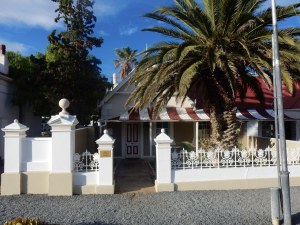I have just returned from a distinctly unliterary holiday in South Africa and Zimbabwe, with little literary to report. The South Africans I talked to were fairly ignorant of their own literature and professed to being far more interested in the great outdoors or cricket than in books. (For those more concerned with the Panthers vs the Broncos or what the rest of the world calls football, England and South Africa have just been playing each other at cricket in South Africa for the past few weeks. It would be churlish of me to mention the fact that England won the series.) If they had read a South African author, it was Deon Meyer in both English and Afrikaans. No-one had heard of Marlene van Niekerk or Achmat Dangor and few had heard of J M Coetzee. No matter. At least England won the cricket or have I already mentioned that?
I visited three bookshops, one in Zimbabwe and two in South Africa, though both in the same chain and very similar to one another. The one in Zimbabwe sold children’s books, educational books and a few shoddy UK and US popular paperback novels. There was not a Zimbabwean novel to be seen. The one in South Africa had a big display up front but all were nonfiction (a lot about the problems of South Africa and quite a few travel books). They did have a section called African literature, which was far smaller than the general fiction section, which contained mainly UK and US novels. The African literature section had quite a few South African novels but not all of them were new. The newer ones included Imraan Coovadia’s Tales of the Metric System, a story of how ten days spread across four decades send tidal waves through the lives of ordinary and extraordinary South Africans alike, coming out in the UK and US in April this year; Damon Galgut’s Arctic Summer, which came out in the UK and US last year and is a novel about E M Forster; Petina Gappah’s Book of Memory, which also came out in the UK and US last year and which is about a woman called Memory in prison for murdering her adoptive father; Irma Joubert’s Het meisje uit de trein (The Girl from the Train) (no, not that one), which came out in Afrikaans in 2011 and last year in English in the UK and US, about a German Jewish girl who escapes from a train bound for Auschwitz and ends up in South Africa; Zakes Mda’s Rachel’s Blue, coming out in March in the UK and US, and concerning rape in a US college town; Masande Ntshanga’s The Reactive, already out in Kindle format in the UK and the US but only appearing in print next June, about young South Africans dealing with HIV/AIDS; Sindiwe Magona’s Chasing The Tails of My Father’s Cattle, published in South Africa last year but with no publication date in the UK and the US, about the lives of women in rural South African communities, which I hope to get to soon; and Ingrid Winterbach’s Vlakwater (it means shallow water). She writes in Afrikaans (the photo at left above shows the Afrikaans bookcase in the bookshop I visited) though some of her books have been translated into English. This one, which came out last year, has yet to be translated. It is a bizarre murder mystery.
Before Karen Blixen, whom we all remember for the film, there was Olive Schreiner, who wrote about her African farm before Karen Blixen wrote about hers. The cottage at right belonged to Schreiner in the small town of Matjiesfontein in the Karoo. You cannot simpy visit it, though you can stay in it. This was, I am afraid, all of my literary ramblings.


Tales of the Metric System looks good. It will be available in the U.S. in mid-April.